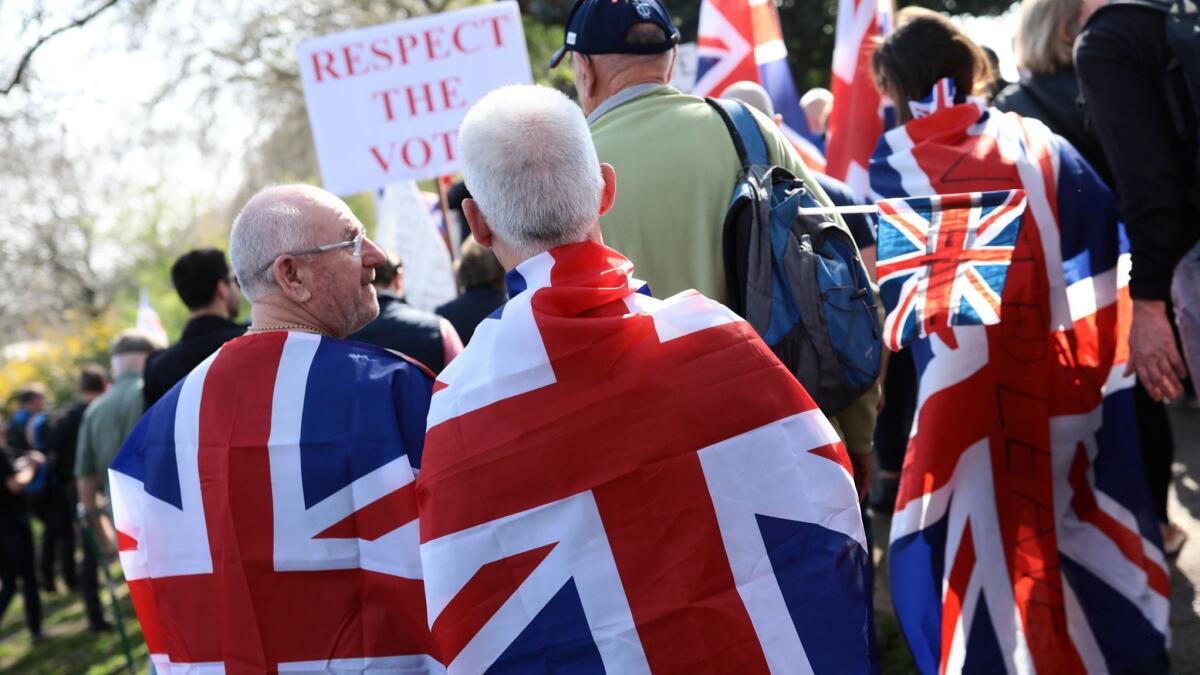British lawmakers reject Prime Minister Theresa May’s Brexit deal for a third time

- Share via
Reporting from London — British lawmakers on Friday rejected the government’s divorce deal with the European Union for a third time, leaving the date and terms of the nation’s departure from the bloc uncertain.
The House of Commons voted 344 to 286 against the withdrawal agreement struck between Prime Minister Theresa May and the EU.
The vote follows defeats by even wider margins in January and March, and leaves the government’s blueprint for exiting the EU in tatters.
Britain now has until April 12 to tell the EU what it plans to do next. It must either cancel Brexit, seek a longer delay or crash out of the bloc without a deal. U.K. lawmakers plan to hold a series of votes Monday in an attempt to find a new plan.
Almost three years after Britain voted in June 2016 to leave the EU, the country’s politicians remain deeply gridlocked over Brexit. May had urged divided legislators to support the deal and finally break an impasse that has left Britons uncertain when, or even if, the country will leave the EU.
She had asked the lawmakers “to put aside self and party … [and] accept the responsibility given to us by the British people.”
But the deal still was voted down, even after May sacrificed her job for her deal, promising to quit if lawmakers approved the Brexit agreement and let the country leave the EU in May. Numerous members of Parliament have criticized her handling of the Brexit process and called for her to step down and let someone else handle the next phase of negotiations.
Some previously resistant Brexit backers had moved to support the deal. Former Foreign Secretary Boris Johnson — a likely contender to replace May as Conservative Party leader — tweeted that rejecting it risked “being forced to accept an even worse version of Brexit or losing Brexit altogether.”
The Democratic Unionist Party in Northern Ireland, a pivotal part of May’s coalition government with 10 seats in the House of Commons, has refused to back the agreement because it treats Northern Ireland differently from the rest of the United Kingdom.
Parliament actually only voted on the legally binding, 585-page withdrawal agreement that May agreed upon with the EU late last year, and did not deal with a declaration on future ties, which is also part of the agreed-upon divorce deal. The withdrawal agreement just sets out the terms of Britain’s departure — including its financial divorce settlement with the EU and the rights of EU and U.K. citizens after Brexit.
The EU confirmed Friday that a British Parliament vote to pass the withdrawal agreement alone was “necessary and sufficient” to secure the U.K.’s orderly departure on May 22.
Removing the political declaration from the Brexit vote altered the deal enough to overcome House of Commons Speaker John Bercow’s invocation of a parliamentary ban against asking lawmakers the same question over and over again.
May also hoped severing the link between the two parts of the deal would blunt opposition — although there was little sign of that.
Labor Party Brexit spokesman Keir Starmer said removing the political declaration from the vote made Brexit “blind, because you don’t know where you are going, now the prime minister has said she is stepping down.”
“So, the political declaration, the future relationship, is going now to be determined in a Tory leadership exercise,” he said.
Two years ago, Britain triggered a two-year countdown to Brexit, with the departure date set for March 29, 2019.
hat date arrived, the U.K. remained at an impasse that has frustrated EU politicians trying to negotiate an exit agreement, and surprised observers around the world who had viewed Britain’s 1,000-year-old parliamentary system as a model of stability.
But with British politicians deadlocked over whether to approve a divorce deal, the EU last week granted an extension. Under its terms, if the withdrawal agreement were approved by 11 p.m. Friday British time, Britain would leave the 28-nation bloc on May 22.
Now that it’s rejected, Britain has until April 12 to announce a new plan — possibly holding a new Brexit vote or an early general election — or leave the EU without a deal, risking severe disruption for people and businesses.
Stefaan De Rynck, a senior advisor to EU chief Brexit negotiator Michel Barnier, said a no-deal Brexit “is a likely scenario.”
“We need to conclude this process now in a way that avoids a no-deal,” he said at a news conference in London.
More to Read
Sign up for Essential California
The most important California stories and recommendations in your inbox every morning.
You may occasionally receive promotional content from the Los Angeles Times.












